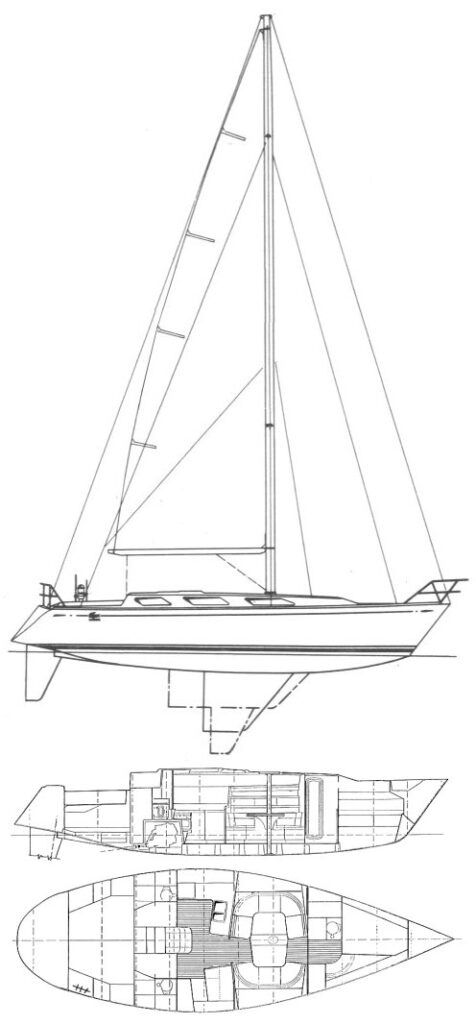The Lacoste 42 is a distinctive performance cruiser, designed by the esteemed naval architecture firm Sparkman & Stephens and built by Yachting France. Produced for a brief period between 1985 and 1991, this yacht was initially conceived as a high-end branding venture, aiming to embody style, performance, and comfort on the water. Despite its ambitious origins, which some have described as a marketing challenge, the Lacoste 42 earned a reputation among owners and crews as an excellent and superb sailing vessel, renowned for its long-legged performance and elegant lines.
Lacoste 42 Information, Review, Specs

- Make
- Model
- Number Built
- 50
- Production Year(s)
- 1985 - 1991
The Lacoste 42, an S&S design (#2462), made its debut at the Paris Boat Show in 1985. Commissioned by the Lacoste brand, the design brief for these yachts emphasized a blend of style, performance, and comfort, leading Sparkman & Stephens to create a vessel with the exterior characteristics of a high-performance racer, featuring a tall, narrow, and intricate rig, along with a deck layout optimized for a racing crew. Conversely, the interior was crafted for traditional style and comfort.
Yachting France, the builder, was a major consolidated French boatyard that emerged in the 1970s, known for producing robust and practical fiberglass sailing yachts through efficient, mass-production techniques. This expertise was applied to the Lacoste 42, which featured a solid fiberglass hull and deck construction. While only around 12 units were built under the Lacoste name, the design found a second life when later boats in the production run were sold as the Dufour 42. Two primary keel configurations were offered: a fixed keel with a maximum draft of 7.5 feet, and a versatile keel-centerboard version with a draft ranging from 5.00 feet with the board up to 9.32 feet with the board down, providing adaptability for various cruising grounds.
Sailing Performance and Handling
The Lacoste 42 is engineered for impressive sailing performance, blending stability with a lively character. Its Sail Area to Displacement ratio of approximately 27.22 indicates a boat capable of excelling in lighter winds, placing it firmly in the category of performance-oriented yachts, where ratios above 24 signify high performance. With a Ballast to Displacement ratio of around 0.46, the yacht boasts significant stability, allowing it to stand up well to a strong breeze and maintain a comfortable motion even in a seaway. This high ballast ratio contributes to a stiff and reassuring feel under sail.
The Displacement to Length ratio of approximately 162 further underscores its design as a performance cruiser, striking a balance between light displacement for speed and sufficient heft for comfortable cruising. Owners and sailing enthusiasts often praise the Lacoste 42's excellent handling characteristics, describing it as a "very nice sailing ship" with a responsive feel. Its deep, high-aspect fin keel and spade rudder contribute to its agility and control, allowing it to point well and handle predictably across a range of conditions. Many experienced sailors compare its sailing characteristics favorably to other well-regarded performance cruisers of its era, such as C&C, Hylas 42, Nordic 44, or Choate 40 models.
Accommodations and Layout
The interior of the Lacoste 42 prioritizes traditional style and comfort, offering a welcoming and functional living space below deck. The yacht features a generous maximum headroom of 6.4 feet, contributing to an open and unconfined atmosphere. The interior is notably appointed with beautiful teak paneling, which adds a classic marine aesthetic and a sense of warmth throughout the cabin.
While specific detailed layouts can vary, the design typically includes a well-arranged salon, providing ample seating and dining space. The galley is generally configured to be practical for offshore cruising, allowing for efficient meal preparation. Accommodations usually comprise a V-berth forward, a comfortable owner's cabin, and often additional berths or convertibles in the salon or quarter berths, ensuring comfortable sleeping arrangements for a crew or family. Furthermore, the design incorporates abundant storage solutions throughout the vessel, critical for extended voyages, complementing the overall emphasis on comfort and practicality for its intended use as a performance cruiser.
Measurements
Construction & Hull
- Construction Material
- Fiberglass (Solid)
- Hull Type
- Monohull Sailboat
- Keel Type
- Fin
- Rudder
- 1x Spade
- Ballast
- 7661 lbs
- Displacement
- 16535 lbs
- Water Capacity
- 106 gal
- Fuel Capacity
- 42 gal
Engine
- Engine Make
- Perkins
- Engine Model
- —
- Engine Type
- —
- Engine HP
- 50
- Engine Count
- 1
- Drive Type
- —
- Fuel Type
- Diesel
Rig & Sails
- Rig Type
- Masthead Sloop
- P (Main Luff)
- 46.1 ft
- E (Main Foot)
- 14.3 ft
- I (Foretriangle Height)
- 52.5 ft
- J (Foretriangle Base)
- 29.5 ft
- Forestay Length (est)
- 60.22 ft
- Main Sail Area
- 329.62 sqft
- Foretriangle Sail Area
- 774.38 sqft
- Total Sail Area (Reported)
- 1076.4 sqft
- Total Sail Area (Calc)
- 1103.99 sqft
Dimensions
- LOA
- 42.17 ft
- LWL
- 35.75 ft
- Beam
- 12.92 ft
- Draft
- 7.5 ft
- Max Headroom
- 6.4 ft
- Air Draft
- -
Calculations
- Hull Speed
- 8.01 kn
- Pounds per Inch Immersion
- 1